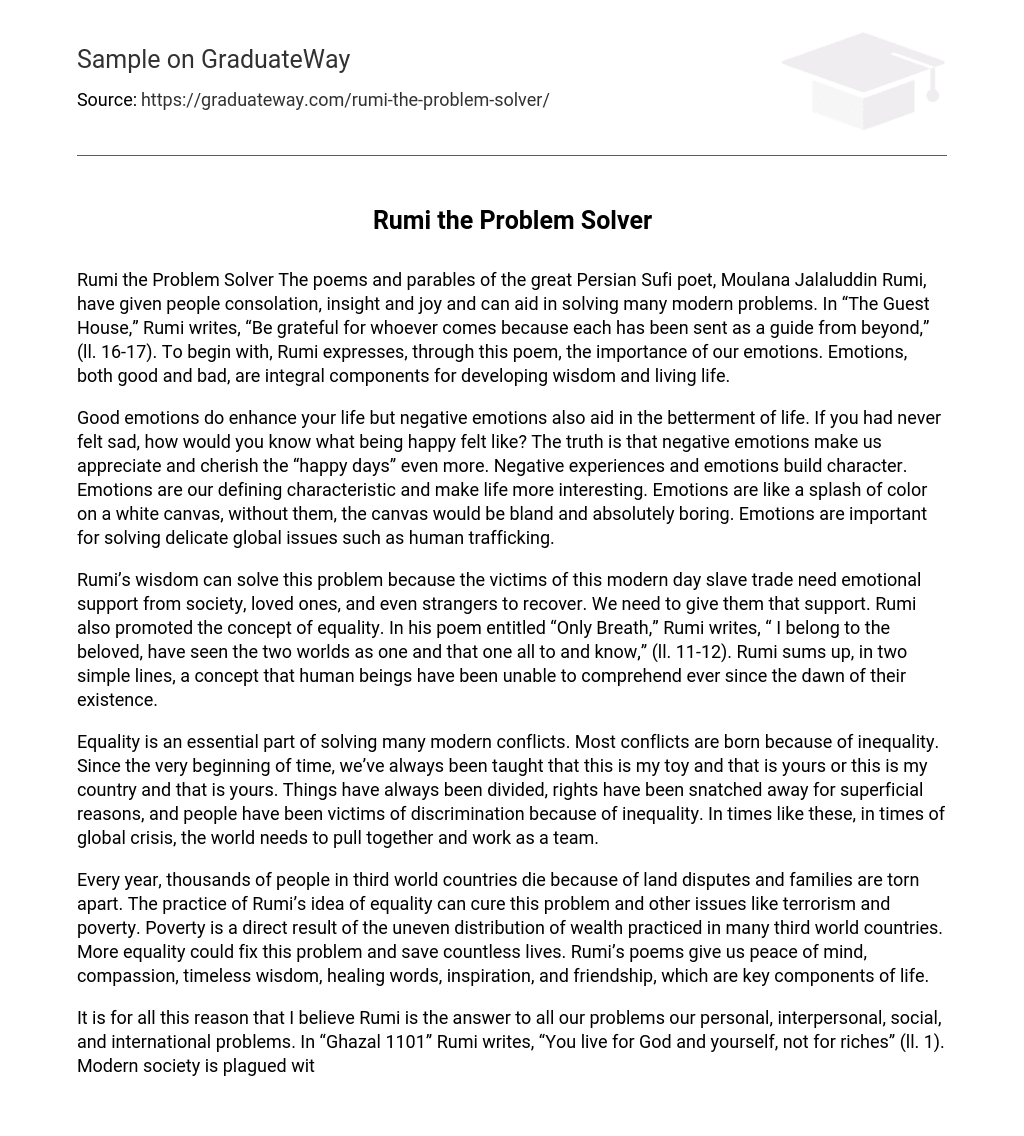The poems and parables of the great Persian Sufi poet, Moulana Jalaluddin Rumi, have given people consolation, insight and joy and can aid in solving many modern problems. In “The Guest House,” Rumi writes, “Be grateful for whoever comes because each has been sent as a guide from beyond,” (ll. 16-17). To begin with, Rumi expresses, through this poem, the importance of our emotions. Emotions, both good and bad, are integral components for developing wisdom and living life.
Good emotions do enhance your life but negative emotions also aid in the betterment of life. If you had never felt sad, how would you know what being happy felt like? The truth is that negative emotions make us appreciate and cherish the “happy days” even more. Negative experiences and emotions build character. Emotions are our defining characteristic and make life more interesting. Emotions are like a splash of color on a white canvas, without them, the canvas would be bland and absolutely boring. Emotions are important for solving delicate global issues such as human trafficking.
Rumi’s wisdom can solve this problem because the victims of this modern day slave trade need emotional support from society, loved ones, and even strangers to recover. We need to give them that support. Rumi also promoted the concept of equality. In his poem entitled “Only Breath,” Rumi writes, “ I belong to the beloved, have seen the two worlds as one and that one all to and know,” (ll. 11-12). Rumi sums up, in two simple lines, a concept that human beings have been unable to comprehend ever since the dawn of their existence.
Equality is an essential part of solving many modern conflicts. Most conflicts are born because of inequality. Since the very beginning of time, we’ve always been taught that this is my toy and that is yours or this is my country and that is yours. Things have always been divided, rights have been snatched away for superficial reasons, and people have been victims of discrimination because of inequality. In times like these, in times of global crisis, the world needs to pull together and work as a team.
Every year, thousands of people in third world countries die because of land disputes and families are torn apart. The practice of Rumi’s idea of equality can cure this problem and other issues like terrorism and poverty. Poverty is a direct result of the uneven distribution of wealth practiced in many third world countries. More equality could fix this problem and save countless lives. Rumi’s poems give us peace of mind, compassion, timeless wisdom, healing words, inspiration, and friendship, which are key components of life.
It is for all this reason that I believe Rumi is the answer to all our problems our personal, interpersonal, social, and international problems. In “Ghazal 1101” Rumi writes, “You live for God and yourself, not for riches” (ll. 1). Modern society is plagued with greed; there is evidence everywhere. People like Bernie Madoff have stripped thousands of their wealth and families are torn apart because of greed. Embracing Rumi’s message about greed could solve the economical crises like ours.
If money hadn’t been lost in financial scams, the economy would be in a much better place. Families would be saved and elder abuse would stop. The more we read and enjoy Rumi’s poems, the more compassionate and the less selfish and less greedy we become. The more Rumi’s poetry spreads around the world and enlightens people’s mind, there will be more peace and happiness in the world. If our political leaders read and understand Rumi’s poetry and live up to that understanding, the less violent and the more friendly nations will be.
If you think that religious fanatics are destroying human life and freedom, Rumi is the answer because he calls for understanding, tolerance and friendship, and views love and compassion as rays of the Divine light shining upon our inner being. The fact that Rumi’s sweet poems are on our lips seven centuries after his death testify to the truth of Rumi’s vision and the beauty of his poetry. Rumi is badly needed in our increasingly interdependent world because Rumi’s constituency is not a particular creed or community but the human heart.





